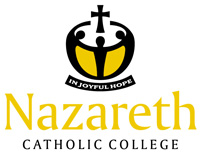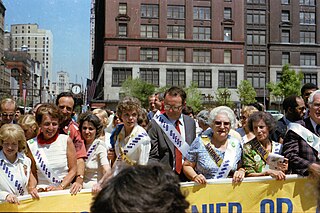Related Research Articles
The women's liberation movement (WLM) was a political alignment of women and feminist intellectualism. It emerged in the late 1960s and continued til the 1980s, primarily in the industrialized nations of the Western world, which resulted in great change throughout the world. The WLM branch of radical feminism, based in contemporary philosophy, comprised women of racially and culturally diverse backgrounds who proposed that economic, psychological, and social freedom were necessary for women to progress from being second-class citizens in their societies.
Second-wave feminism was a period of feminist activity that began in the early 1960s and lasted roughly two decades, ending with the feminist sex wars in the early 1980s and being replaced by third-wave feminism in the early 1990s. It occurred throughout the Western world and aimed to increase women's equality by building on the feminist gains of the late 19th and early 20th centuries.
The women's liberation movement (WLM) was a political alignment of women and feminist intellectualism. It emerged in the late 1960s and continued til the 1980s, primarily in the industrialized nations of the Western world, which resulted in great change throughout the world. The WLM branch of radical feminism, based in contemporary philosophy, comprised women of racially and culturally diverse backgrounds who proposed that economic, psychological, and social freedom were necessary for women to progress from being second-class citizens in their societies.
Gleeson College is a Catholic secondary school in Golden Grove, South Australia. The college is named after the late Emeritus Archbishop of Adelaide, James William Gleeson and the motto "With one heart" derives from his serving for 10 years (1971–1981) on the Pontifical Council Cor Unum.
The Women's Electoral Lobby (WEL) is a feminist, non-profit, self-funded, non-party political, lobby group founded in 1972 during the height of second-wave feminism in Australia. WEL's mission is to create a society where women's participation and potential are unrestricted, acknowledged and respected and where women and men share equally in society's responsibilities and rewards.
Marie Tulip was an Australian feminist writer, academic and proponent for the ordination of women as priests.

The Nazareth Catholic College is an independent Roman Catholic co-educational primary and secondary day school located across four campuses in suburban Adelaide: a primary school campus in Findon, a middle school campus (7-9) in Flinders Park, a Year 10 campus in Underdale, and a senior school campus (11-12) in Kidman Park,in South Australia, Australia

Anne Summers is an Australian writer and columnist, best known as a leading feminist, editor and publisher. She was formerly First Assistant Secretary of the Office of the Status of Women in the Department of the Prime Minister and Cabinet. Her contributions are also noted in The Australian Media Hall of Fame biographical entry
Feminist pedagogy is a pedagogical framework grounded in feminist theory. It embraces a set of epistemological theories, teaching strategies, approaches to content, classroom practices, and teacher-student relationships. Feminist pedagogy, along with other kinds of progressive and critical pedagogy, considers knowledge to be socially constructed.

The personal is political, also termed The private is political, is a political argument used as a rallying slogan by student activist movements and second-wave feminism from the late 1960s. In the feminist movement of the 1960s and 1970s, it was seen as a challenge to the nuclear family and family values. The phrase was popularized by the publication of feminist activist Carol Hanisch's 1969 essay, "The Personal Is Political." The phrase and idea have been repeatedly described as a defining characterization of second-wave feminism, radical feminism, women's studies, or feminism in general. It has also been used by some female artists as the underlying philosophy for their art practice.
Australia has a long-standing association with the protection and creation of women's rights. Australia was the second country in the world to give women the right to vote and the first to give women the right to be elected to a national parliament. The Australian state of South Australia, then a British colony, was the first parliament in the world to grant some women full suffrage rights. Australia has since had multiple notable women serving in public office as well as other fields. In Australia, European women were granted the right to vote and to be elected at federal elections in 1902.
Ann Foster Newmarch, known as "Annie", was a South Australian painter, printmaker, sculptor and academic, with an international reputation, known for her community service to art, social activism and feminism. She co-founded the Progressive Art Movement and the Women's Art Movement (WAM) in Adelaide, and is especially known for her iconic 1978 colour screenprint piece titled Women Hold Up Half the Sky!.
Indigenous feminism is an intersectional theory and practice of feminism that focuses on decolonization, Indigenous sovereignty, and human rights for Indigenous women and their families. The focus is to empower Indigenous women in the context of Indigenous cultural values and priorities, rather than mainstream, white, patriarchal ones. In this cultural perspective, it can be compared to womanism in the African-American communities.
Margaret Chilla Bulbeck was the emeritus professor of women's studies at Adelaide University from 1997 until 2008, and has published widely on issues of gender and difference.
Aileen Moreton-Robinson is an Indigenous Australian academic, Indigenous feminist, author and activist for Indigenous rights. She is a Goenpul woman of the Quandamooka people from Minjerribah in Queensland. She completed a PhD at Griffith University in 1998, her thesis titled Talkin' up to the white woman: Indigenous women and feminism in Australia. The thesis was published as a book in 1999 and short-listed for the New South Wales Premier's Literary Awards and the Stanner Award. A 20th Anniversary Edition was released in 2020 by University of Queensland Press. Her 2015 monograph The White Possessive: Property, Power, and Indigenous Sovereignty was awarded the Native American and Indigenous Studies Association's (NAISA) prize in 2016.

Feminism in South Africa concerns the organised efforts to improve the rights of the girls and women of South Africa. These efforts are largely linked to issues of feminism and gender equality on one hand, and racial equality and the political freedoms of African and other non-White South African ethnic groups on the other. Early feminist efforts concerned the suffrage of White women, allowing them to vote in elections beginning from 1930s, and significant activism in the 1950s to demand equal pay of men and women. The 1980s were a major turning point in the advancement of South African women, and in 1994, following the end of the apartheid regime, the status of women was bolstered by changes to the country's constitution. Since the end of apartheid, South African feminism is a contribution associated with the liberation and democratization of the country, however, the movement still struggles with the embedded conservative and patriarchal views within some segments of South African society.
Joyce Stevens AM (1928–2014) was an Australian socialist-feminist activist, communist, and historian, one of the founders of the women's liberation movement in Sydney, prominent in the wave of feminism that began in the late 1960s in Australia.
Constance Winifred Frazer was an Australian poet, feminist, revolutionist and writer.
The women's liberation movement in Oceania was a feminist movement that started in the late 1960s and continued through the early 1980s. Influenced by the movement which sought to make personal issues political and bring discussion of sexism into the political discourse in the United States and elsewhere, women in Australia and New Zealand began forming WLM groups in 1969 and 1970. Few organisations formed in the Pacific Islands, but both Fiji and Guam had women affiliated with the movement.
Diana Mary Leonard, AcSS, known while married as Diana Leonard Barker, was a British sociologist, social anthropologist, academic, and feminist activist. From 1998 to 2007, she was Professor of Sociology at the Institute of Education, London, after which she was Emeritus Professor of the Sociology of Education and Gender department there.
References
- Barber, Jenny, "Women's Movement South Australia" Experimental Art Foundation, St Peters, South Australia. ISBN 0-949836-03-6.
- Caine, Barbara, "Australian Feminism: a companion" Oxford University Press Australia, South Melbourne. ISBN 0-19-553818-8.
- ↑ "WSRC Needs Your Help! | Women's Studies Resource Centre". 2 September 2011. Archived from the original on 2 September 2011. Retrieved 28 December 2018.
- ↑ "Women's Movement page 6". SA Memory. State Library of South Australia. 4 May 2007. Retrieved 28 December 2018.